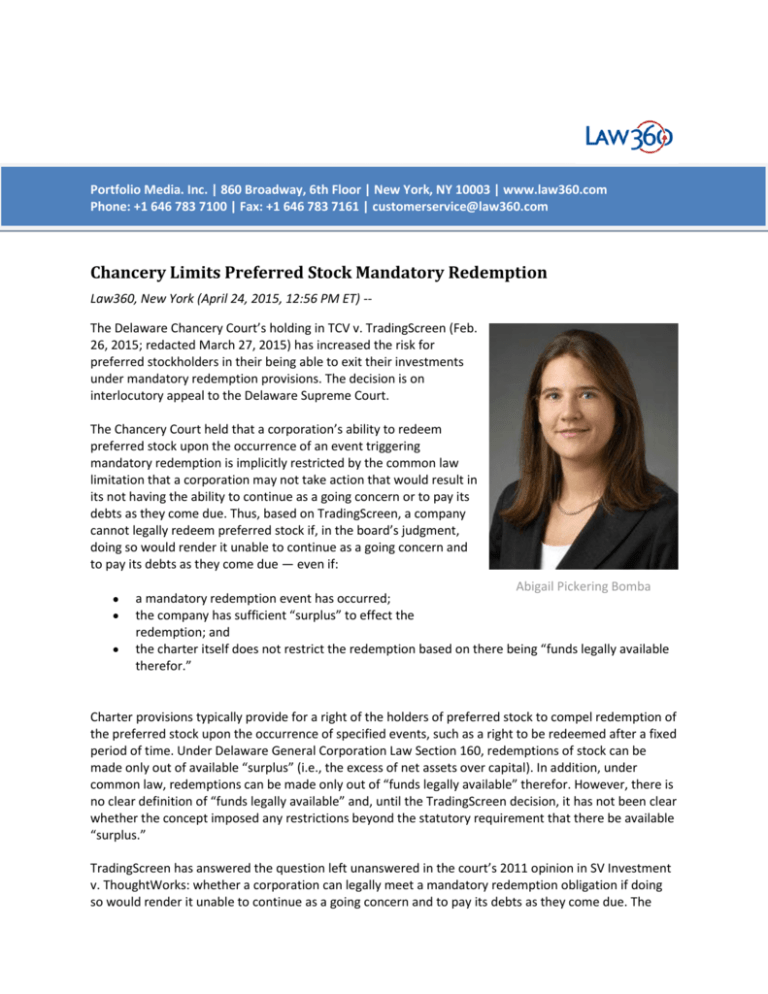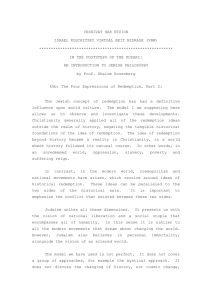Chancery Limits Preferred Stock Mandatory Redemption
advertisement

Portfolio Media. Inc. | 860 Broadway, 6th Floor | New York, NY 10003 | www.law360.com Phone: +1 646 783 7100 | Fax: +1 646 783 7161 | customerservice@law360.com Chancery Limits Preferred Stock Mandatory Redemption Law360, New York (April 24, 2015, 12:56 PM ET) -The Delaware Chancery Court’s holding in TCV v. TradingScreen (Feb. 26, 2015; redacted March 27, 2015) has increased the risk for preferred stockholders in their being able to exit their investments under mandatory redemption provisions. The decision is on interlocutory appeal to the Delaware Supreme Court. The Chancery Court held that a corporation’s ability to redeem preferred stock upon the occurrence of an event triggering mandatory redemption is implicitly restricted by the common law limitation that a corporation may not take action that would result in its not having the ability to continue as a going concern or to pay its debts as they come due. Thus, based on TradingScreen, a company cannot legally redeem preferred stock if, in the board’s judgment, doing so would render it unable to continue as a going concern and to pay its debts as they come due — even if: Abigail Pickering Bomba a mandatory redemption event has occurred; the company has sufficient “surplus” to effect the redemption; and the charter itself does not restrict the redemption based on there being “funds legally available therefor.” Charter provisions typically provide for a right of the holders of preferred stock to compel redemption of the preferred stock upon the occurrence of specified events, such as a right to be redeemed after a fixed period of time. Under Delaware General Corporation Law Section 160, redemptions of stock can be made only out of available “surplus” (i.e., the excess of net assets over capital). In addition, under common law, redemptions can be made only out of “funds legally available” therefor. However, there is no clear definition of “funds legally available” and, until the TradingScreen decision, it has not been clear whether the concept imposed any restrictions beyond the statutory requirement that there be available “surplus.” TradingScreen has answered the question left unanswered in the court’s 2011 opinion in SV Investment v. ThoughtWorks: whether a corporation can legally meet a mandatory redemption obligation if doing so would render it unable to continue as a going concern and to pay its debts as they come due. The court’s determination that a corporation cannot do so had been suggested — but not decided — in ThoughtWorks. In ThoughtWorks, where the court found that the evidence indicated that the company did not have surplus sufficient to meet its mandatory redemption obligation, the court upheld a board’s determination not to redeem the preferred stock. The company had argued that “legally available funds” meant nothing more than available “surplus.” The company also had argued that, if “legally available funds” meant that sufficient funds had to be available so that the company could continue as a going concern, the board had determined that its funds were not sufficient to enable it to continue as a going concern and pay its debts when due. The court strongly suggested that “legally available funds” means more than just available “surplus,” but refused to rule on the issue, finding that the plaintiff had not met the burden of proving that the company did not have “legally available funds” regardless of how the term was defined. In TradingScreen, the plaintiff private equity firms that were preferred stockholders attempted to exercise their rights under the company’s charter to require the company to repurchase their shares (at a price determined by an independent expert), which they had the right to do after a specified date if at that time no third-party buyers for the stock could be found. TradingScreen claimed that it could only fund a partial redemption because fully meeting the plaintiffs’ demands would threaten the company’s ability to continue as a going concern. The plaintiffs moved for judgment on the pleadings that TradingScreen had breached its charter obligations. The Delaware Chancery Court held that the redemption obligation was subject not only to the explicit restrictions regarding surplus included in DGCL Section 160 but also to recognized common-law restrictions on stock redemptions that are independent of, and in addition to, the DGCL’s explicit provisions. The court ruled that the company had been “legally prohibited” from making the redemption payments as the payments would have impaired the company’s ability to continue as a going concern and pay its debts when due. In response to the plaintiffs’ request for a declaratory judgment that interest (at 13 percent) had begun to accrue, the court found that it could not rule that interest should start accruing as the charter provided that interest would accrue in the event of a “default” on any payments due, rather than upon a “failure for any reason” to make a payment. We note that the analysis and commentary related to the TradingScreen decision has been complicated by the court’s language — sometimes referring to a common-law restriction that funds cannot be used to redeem stock if the company would be rendered unable to continue as a going concern and to pay its debts when due (i.e., an insolvency concept) and sometimes referring only to the going-concern prong (i.e., a standard that would be something less than insolvency). Some commentators have therefore, in our view, overstated the increased risk to preferred stock holders resulting from the decision, as they interpret the court’s language as meaning that redemption would not be allowed if the company could not continue as a going concern although not insolvent. While the language is not perfectly clear, our view is that the court clearly intended that the restriction be based on an insolvency standard. Practice Points Preferred stockholders seeking to protect their exit rights should consider the following: Need to Draft Penalty Provisions So That They are Triggered by “Nonpayment” Rather Than “Default.” An investor may seek penalty provisions that would apply in the event a mandatory redemption right is not satisfied by the corporation — including, for example, a right: to a penalty interest rate; to elect directors or control the board; to receive additional shares or other economic benefits; or to initiate and/or control a sale process. TradingScreen underscores that the penalty should be triggered by the corporation’s nonpayment of the full redemption amount “for any reason” upon the occurrence of a redemption triggering event, without characterization of the nonpayment as a “default” of the redemption obligation. Use of a Noncorporate Investment Vehicle. Limited liability companies and limited partnerships are not subject to the same fiduciary duties owed to corporate stockholders, nor to the restriction that repurchases of interests be made out of “legally available funds.” Thus, these issues would not be present if an investment were structured as an interest in a limited liability company or limited partnership in lieu of (although mirroring) a preferred stock investment in a corporation. Of course, the effect on the marketability of the company and of any preferred stock interest in the company would have to be considered. Purchase of Debt Instead of Preferred Stock. If an investment is made in debt rather than preferred stock, the holder’s exit rights would be subject only to laws regarding creditors’ rights in the event of insolvency. Debt investments (such as debt with warrant coverage or convertible debt) can be structured to mirror the benefits of an equity investment, while providing for a right of repayment that would not be subject to the availability of surplus or of other “legally available funds.” (The effectiveness of this technique, as a practical matter, may depend on whether the investment could be structured to be the equivalent of debt vis-a-vis the corporation but preferred stock vis-a-vis the other debtholders — so that the investment would be acceptable to other debtholders because it would be considered in a bankruptcy as if it were equity and not debt.) Fiduciary Duties of Directors. It should be noted that, in its 2012 Trados decision, the Chancery Court generally emphasized the contractual nature of preferred stock and therefore the limited fiduciary duties that directors owe to preferred stockholders as compared to common stockholders. The court clarified that, when directors weigh the interests of holders of preferred stock against the interests of the holders of common stock, they should generally prefer the interests of the common stock even if at the expense of the interests of the preferred stock. This issue is highlighted in any case involving the redemption of preferred stock where the use of funds to redeem the preferred could affect the viability of the common stock interests (including, for example, a sale of the company in which the common stockholders would receive little or no value because the sale proceeds go largely or exclusively to pay for the preferred stock’s liquidation preference triggered by the sale). Sale of the Company When All of the Proceeds Will Go to the Preferred Stock. As noted, the issues relating to redemption of preferred stock are highlighted in the case of sale of a company in a distressed situation or other circumstances under which the sale proceeds are likely to be sufficient only to pay the liquidation preference on preferred stock, with little or nothing left for consideration to the common stockholders. If a sale process meeting the procedural safeguards of MFW is utilized, the decision to sell could be evaluated under the business judgment standard of review. Compliance with MFW under these circumstances usually will not be practical as MFW requires that the sale be subject to approval by the stockholders — and thus would provide the common stockholders, who would have little economic interest under the circumstances, with an effective veto right on a sale and increased bargaining leverage. However, even when, as in the 2013 Trados decision, the Chancery Court reviewed under the entire fairness standard a sale in which all of the proceeds went to pay the preferred stockholders’ liquidation preference and the common stockholders received nothing, the court upheld the sale decision, reasoning that zero was a fair price for the common stock as it had no value. Possible Mandatory Sale of the Company if a Mandatory Redemption Obligation is Not Met. A provision requiring a sale of the company if the preferred stock has not been redeemed within a specified period of time after a mandatory redemption event — unless the preferred stockholders do not then want a sale — could be considered. Financial Impact of Increased Risk. It remains to be seen whether the potential increased risk of a preferred stock investment based on the TradingScreen holding will affect the ability to arrange, or the cost of, preferred stock financing for a leveraged buyout or otherwise adversely affect capital markets involving preferred stock. To the extent that preferred stock financing would become more difficult or expensive, it should be considered whether it would be possible to reduce the risk through a backup letter of credit or other mechanism to finance a mandatory redemption. (As a practical matter, this financing would have to be structured to ensure that the provider would be considered a debtholder in the event of insolvency of the company.) As noted, final adjudication of these issues now awaits review by the Delaware Supreme Court. —By Abigail Pickering Bomba, Steven Epstein, Arthur Fleischer Jr., Peter S. Golden, Brian T. Mangino, Philip Richter, Robert C. Schwenkel, John E. Sorkin and Gail Weinstein,Fried Frank Harris Shriver & Jacobson LLP Abigail Pickering Bomba, Steven Epstein, Peter Golden, Philip Richter, Robert Schwenkel and John Sorkin are partners in Fried Frank's New York office. Brian Mangino is a partner in Washington, D.C. Arthur Fleischer and Gail Weinstein are senior counsel in New York. This article is from Fried Frank's M&A Quarterly. The opinions expressed are those of the author(s) and do not necessarily reflect the views of the firm, its clients, or Portfolio Media Inc., or any of its or their respective affiliates. This article is for general information purposes and is not intended to be and should not be taken as legal advice. All Content © 2003-2015, Portfolio Media, Inc.






